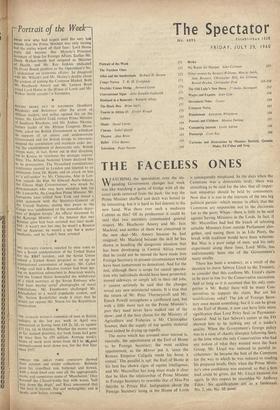THE FACELESS ONES W ATCHING the speculation over the im- pending
Government changes last week was like watching a game of bridge with all the court cards removed from the pack; the way the Prime Minister shuffled and dealt was bound to be interesting, but it is hard to feel interest in his new hand. Was there ever such a mediocre Cabinet as this? Of its predecessor it could be said that two members commanded general respect. Mr. Heathcote Amory and Mr. Lain Macleod, and neither of them was concerned in the new deal—Mr. Amory because he had resigned; Mr. Macleod be-cause the skill he" has shown in handling the dangerous situation that has been developing in Central Africa meant that he could not be moved (to have made him Foreign Secretary in present circumstances would have been tantamount to demotion). And for the rest, although there is scope for casual specula• tion why individuals should have been promoted, moved sideways, or simply left in their old jobs, it cannot seriously be said that the changes reveal any new ministerial talents. It is true that the return of Mr. Peter Thorneycroft and Mr. Enoch Powell strengthens a cardboard cast, but with a little more tact on the Prime Minister's part they need never have walked out of the show; and if the best choice for the Ministry of Agriculture and Fisheries is Mr. Christopher Soames, then the supply of top quality material must indeed be drying up rapidly.
The move which has aroused most interest is, naturally, the appointment of the Earl of Home to be Foreign Secretary; the most reckless appointment, as the Mirror put it, 'since the Roman Emperor Caligula made his horse a consul.' The parallel is apt; the Earl of Home at his best has shown signs of equine intelligence, and Mr. Macmillan has long since made it clear that he likes the relationship of Prime Minister to Foreign Secretary to resemble that of Miss Pat Smythe to Prince Hal. Indignation about the Foreign Secretary being in the House of Lords is consequently misplaced. In the days when the Commons was a democratic body, there was something to be said for the idea that all impor- tant ministries should be held by commoners. Now that it is run in the interests of the two big political parties—which means, in effect, that the Commons are responsible not to the electorate but to the party Whips—there is little to be said against having Ministers in the Lords. In fact, if Mr. Macmillan had had the knack of selecting suitable Ministers from outside Parliament alto- gether, and easing them in as Life Peers, the break with tradition would have been welcome. But Mac is a poor judge of men; and his only experiment along these lines, Lord Mills, has unfortunately been one of the Government's many misfits.
There has been a tendency, as a result of the decision to .move Selwyn Lloyd to the Treasury, to consider that this confirms Mr. Lloyd's claim to be next in line for the Conservative succession. And so long as it is assumed that his only com- petitor is Mr. Butler there will be many Con- servatives to support the claim. But are his qualifications valid? The job of Foreign Secre- tary once meant something; but if it can be given to the Earl of Home, it now can have little more significance than Lord Privy Seal; or Paymaster- General. And in fact Selwyn's career at the FO showed him to be lacking any of a leader's quality. When the Government's foreign policy was in a state of chaotic disrepair following Suez, at the time when the only Conservatives who had any notion of what they wanted were the Suez Group, Mr. Lloyd was reduced to painful in- coherence: he became the butt of the Commons for the way in which he was reduced to reading his prepared briefs. Only when the Prime Minis- ter's own confidence was restored, so that a firm lead could be given, did Mr. Lloyd blossom out again. In this respect he resembles Sir Anthony Eden: his qualifications are as a lieutenant. No. 2, yes; No. 10, never.


































 Previous page
Previous page